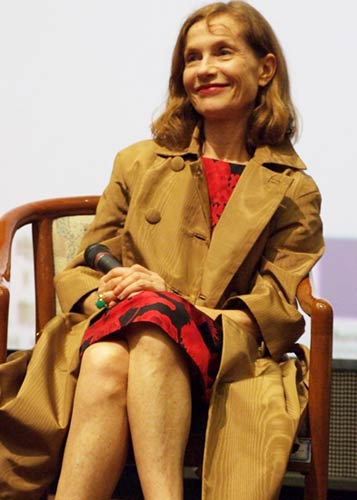|

|
|
French actress Isabelle Huppert talks to Chinese movie fans at the China Film Archive on June 18, 2009. |
By Pang Li
The French take pride in the distinctive qualities of their artistic productions. In this respect, they can sometimes appear aloof, even arrogant, but they are undeniably elegant. French film-makers persist in promoting their distinctive style around the world and many sniff at tycoon Luc Besson for commercializing movie production on Hollywood lines, a process they fear will result in France losing its cinematic identity. For the present, however, the distinctive characteristics of French films seem in no danger of disappearing.
Isabelle Huppert, an icon of French cinema with a career spanning three decades, is the quintessential representative of French cinematic art, renowned both for her artistic integrity and the diversity of her repertoire. After presiding over the 62nd Cannes International Festival in May, Ms Huppert arrived in Beijing on June 18 where she joined Chinese director Wang Xiaoshuai at the China Film Archive in a lively discussion.
Dressed in a bright red dress and brown coat, the 56 year old actress walked into the screening room where more than one hundred passionate Chinese movie fans had gathered. She spoke concisely, tossing her head to the side from time to time.
She said she admired Chinese cinema and had particularly enjoyed the screening of Spring Fever at Cannes (the film, directed by Lou Ye, won the award for Best Screenplay). She said she hoped to work with a Chinese director some day and encouraged Chinese movie-makers to continue to make their own distinct style of movies.
Ms Huppert also shared some of her film-making experience. She said the major reason for her choosing a movie project was always the director. For her, a good director can help actors reach depths in their souls they would not be able to reach alone. She said she had been lucky to work with great artists such as Michael Haneke (who directed Ms Huppert in La pianiste, 2001) and Jean-Luc Godard (who directed Ms Huppert in Sauve qui peut, 1980 and Passion, 1982).
Ms Huppert recalled that she had visited Beijing for the first time in 1992. She remarked on the enormous changes that the city had undergone over last decade, in particular the triumph of the car and the disappearance of the city's bicycles.
After the dialogue, the Film Archive screened Madame Bovary, said to be one of Miss Huppert's personal favorites, which won her the Best Actress prize at the Moscow International Film Festival in 1991. In this beautifully crafted movie, Ms Huppert delivered a convincing and powerful performance that must surely rank with the best. Her acting, while icy on the surface, conveyed the intensity of the passions that burned within Emma Bovary. The film takes viewers on a powerful emotional trip as Ms Huppert conveys the agonies her character endures.
I could not help envying France for producing such a great cinematic artist. Unfortunately, many Chinese movie-makers, including, it has to be said, Wang Xiaoshuai, remain stuck in the rather sterile debate about whether Chinese directors should make artistic or commercial movies. Mr Wang is definitely on the artistic side of the argument and took advantage of the occasion to denounce a number of high-grossing Chinese movies as "great failures".
But such arguments seem pointless and out of step with the times. Movies are consumer products that must, on the one hand, be pleasing as artistic creations but, on the other hand, must also be marketable, and therefore commercial. In most cases the two aspects feed off each other.
At present China does not have enough film-makers who are capable of making really enjoyable movies supported by good stories, convincing acting, fine directing and high-quality sets. Movie makers should direct their efforts in these directions, while preserving their distinct artistic approaches. It is perfectly possible for them to continue to experiment with new ideas while learning from their foreign counterparts and developing their professionalism.
It can only help this process to further open up the Chinese movie market and let more foreign films reach the general movie-goer. In the long run, restrictive import quotas do no good to either the market or domestic film-makers.
(China.org.cn, June 22, 2009)